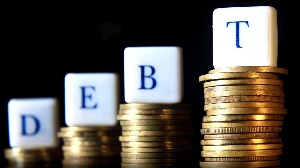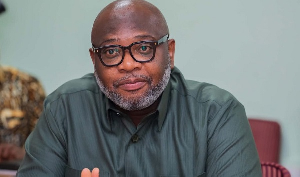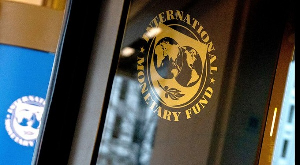Last week, the Ministry of Finance released its domestic debt issuance calendar for the first quarter of 2021, revealing that its plan to issue GH¢22,346.40 million worth of cedi denominated securities, with tenors ranging from 91 days to 20 years, over the period January to March.
The announcement came on the back of an invitation from the ministry for local investment advisory companies just a week earlier to bid for the role of co-managers for its impending Eurobond issuance, which also could be done as early as March this year, and which government hopes to use to attract somewhere between US$3.5 billion and US$5 billion.
It is instructive that in the first weeks of this year, with substansive ministers not yet having been appointed, it is only public debt management issues that are bringing the Ministry of Finance into the public’s spotlight.
To be sure the Ministry is busy primarily with preparing the 2021 national budget, a task for which Ghana is already three months behind the usual schedule of November of the preceding year; but since last year was an election year, the commencement of the budget’s preparation had to wait until a Presidential winner had emerged.
But even with this situation it is instructive that debt management appears to be the priority. It is also inevitable – after years of quiet brinksmanship regarding its indebtedness, government stands on uneven ground and going forward managing the public debt will be significantly more arduous a task than it has been at least since most of the country’s foreign debt was written off nearly two decades ago through the Heavily Indebted Poor Countries (HIPC) initiative and the subsequent Multi-Donor Debt Relief initiative.
With Ghana now finally having exceeded the generally accepted debt sustainability threshold of 70 percent of Gross Domestic Product – after years of postponing this watershed level through two economic rebasing exercises, and a dubious change in how the GDP used as denominator in the computations is arrived at – the country can no longer pretend that it is still in a sustainable position with regards to its public indebtedness
It is most instructive that most of the new debt being taken on during the first few months of the year, both domestic and foreign, is going into refinancing of existing debt, both by rolling over maturities as they arrive, and by replacing shorter term, relatively high coupon rate debt with longer term, relatively lower interest rate debt. Thus GHc19,732.64 million of the nearly GHc22.35 billion in new domestic debt issuances will roll over maturing debt while only US$1.5 billion of the US$3.5 – 5.0 billion in Eurobonds about to be issued will add on to already existing debt, the rest being used to replace already issued debt.
With regards to domestic debt issuances for the first quarter of this year, In January, and February respectively government plans to issue GHc3,000 million in 91 day treasury bills followed by another GHc4,300 in March making for a total issuance of GHc10,400 million in this month. With regards to 182 day bills it will issue GHc550 million in January, GHc600 million in February, and GHc550 million in March making for a total of GHc1,700 million. With regards to 364 day bills it will issue GHc420 million in January, GHc450 million in February and GHc535 million in March, totaling GHc1,405 million. All these will be restricted to domestically domiciled investors.
The longer tenured issuances will be open to both local and foreign investors. Government plans to issue GHc1,610 million in two year notes in January, GHc1,820 million in February and GHc700 in March, totaling GHc4,130 million.
There is to be GHc1,700 million issued through three year bonds, this to be done in March; GHc1,400 through five year bonds also in March; GHc800 million in six year bonds in January; GHc700 million in seven year bonds issued in February; and GHc114.40 million in 20 year bonds to be issued under shelf registration in March.
Expectedly though, even as these issuances are being done, government will also issue its largest volume of Eurobonds since it began tapping into that international capital market back in 2007.The plan is to take as much as US$5 billion if market conditions are favourable with regards to the terms demanded by investors.
There is cause to be optimistic; a month ago Cote D’Ivoire marked the return of sub Saharan Africa to the Eurobond market after an eight month hiatus due to the outbreak of the COVID 19 pandemic with a successful US$2 billion issuance. Furthermore, just last week Ghana’s plans for a Eurobond issuance received a major boost by the latest forecast by international ratings agency, Moody’s, that Ghana will achieve economic growth of four percent in 2021
Moody’s further stated that Ghana’s expected growth rate of 4% will place it 10th on the African continent and 3rd in West Africa.
While Moody’s forecasts warn of continued fiscal problems this year, it however projects that the country’s external financial position will stand up to the challenges of the ongoing COVID 19 triggered trying economic circumstances.
It, said favourable gold prices will likely support Ghana’s current account balance, boosting foreign inflows and stabilizing the cedi.
This latter aspect is the most crucial short term consideration for potential investors into Ghana’s medium to long term Eurobond issuance as it means the country will have the wherewithal to meet its external debt servicing obligations.
Moody’s – being a globally reputed sovereign credit rating agency that has been tracking Ghana for many years – is confidently regarded as a guide by actual international portfolio investors.
Its optimistic forecast for Ghana in 2021 should encourage potential investors in the impending Eurobond issue not to demand overly risk premiums on the bonds to be offered, which means a coupon rate which would be acceptable to Ghana. Crucially, the Ministry of Finance has stated that both the timing and the size of the issue will ultimately be determined by the attitude of the international capital market with regards to pricing.
It also provides a confidence boost for foreign investors considering buying up cedi denominated domestic bonds, as the main concern for them is the danger of foreign exchange rate losses if the cedi slumps against the United States dollar. Moody does not expect this to happen – an assertion supported by the expectations of short term cedi exchange rate stability shown by the bids at last week’s first forward foreign exchange auction for 2021 by the Bank of Ghana.
However, while all this gives cause for optimism over the coming months, there is also cause for concern. Basically, while Ghana has proved successful in refinancing its public debt to secure more breathing space with regards to tenors and lower debt servicing costs through lower coupon rates, it is running out of space for further gains.
With re4gards to its domestic debt it is instructive that even though monetary easing by the BANKL Of Ghana has lowered short term interest rates over the past 10 months, longer term rates have actually risen a notch as government and its central bank strive to retain the interest of foreign portfolio investors in cedi denominated securities despite a runaway fiscal deficit of 11.8 percent for 2020. This means that refinancing of domestic debt to elongate tenors also means higher coupon rates on the new debt being issued, this is in part why government wants to issue an unprecedentedly large volume of Eurobonds, since they carry much lower rates, even though they bring substantial foreign exchange brisk as well.
The strategy for this year is to issue a large tranche of the bonds while monetary easing is still the vogue in the western hemisphere; in the United States for instance federal fund rates are close to zero as the government seeks to provide a monetary stimulus to counteract the adverse economic effects of COVID 19. Last year Ghana secured Eurobond rates of between a little over six percent and a little over eight percent at a time that western hemisphere intertest rates were higher than they are now. The thinking is that Ghana should take advantage to secure relatively low rate debt which can then be used to refinance relatively high rate debt taken in previous years. Indeed, in the middle of the previous decade Ghana issued some Eurobonds at over 10 percent coupon rate.
However there are increasing worries that Ghana’s exceeding the 70 percent debt threshold, since its last Eurobond issuance, coupled with a record high fiscal deficit of 11.8 percent for 2020 –which can only be reined in over the space of several years – will make potential investors demand a wider risk premium for any Eurobond subscriptions this year, which will wipe away the prospect of lower4 coupon rates that can be used to refinance earlier, more expensive bond issuances.
This is why economists are suggesting that it is time to move beyond refinancing of the public debt, to actually paying it down. They argue that under the current circumstances debt servicing costs will rise rather than fall, despite continued monetary easing, because of Ghana’s deteriorating peculiar debt circumstances. They therefore suggest that Ghana should take advantage of depressed prices on Ghana’s earlier Eurobond issuances on the secondary bond market (brought about by historically low coupon rates on new issuances) and buy back its issued bonds on the cheap.
But this is most unlikely to happen to any significant degree for two core reasons.
One is that government already needs all the money it can get to finance its spiked fiscal deficit and meet inescapable higher healthcare costs incurred in fighting the spread of the virus as well as economic amelioration costs for households and small businesses alike; indeed. current deficit financing costs are already inordinately high leaving no space for expenditure on debt buy backs even of secondary market bond prices make this an economically attractive strategy.
The other is political pragmatism; in a political environment where the strategic prudence of paying down the inordinately high public debt is hardly appreciated by the vast majority of the electorate, doing so would be political suicide, more so with the opposition convincing voters that the inevitable resultant reduction in public expenditure on the welfare of the general populace is due to governance ineptitude, insensitivity and corruption rather that long term strategic fiscal prudence. Since Ghana attained the capacity to borrow on commercial terms with tenors longer than the eight year, two term presidential tenor successive administrations have enthusiastically borrowed on such terms to please voters with the resultant public project and programme spending, comfortable in the knowledge that repayment would be someone else’s problem.
The pending snag though is that the previous borrowings of past administrations are now about to start becoming the problem of imcumbent administrations as each successively takes office. The struggles the Mahama administration went through to refinance Ghana’s first Eurobonds issued Kufuor administration in 2007 are well documented and instructively none of that mere US$750 million solitary issuance was actually paid down – it was entirely refinanced.
Two years from now Ghana will have to begin grappling with maturities of US$1 billion every year and at a time debt servicing already consumes nearly twice as large a proportion of public tax revenues as it did in 2017.
So how did Ghana get into such a dire situation. Basically it was a combination of political opportunism – borrow now to please voters and someone else carry the burden of repayment – and the optimistic hope that oil revenues would have grown big enough to accommodate Eurobond amortizations every year, by the time they started falling due.
But this will not happen; no new oilfield has come on stream since 2017 and none are even in development currently, with the expected Aker field in abeyance after expended back and forth between Aker and government over the proposal for a plan of development, delayed commencement of development until COVID 19 triggered an oil price slump that has scared the company away. Springfield’s enthusiastic announcement of a record size discovery by a young indigenous exploration company has remained just that – an announcement. Even as confirmation of the field’s viability by potential operating partners has suspiciously not been forthcoming, the Ministry of Petroleum’s controversial insistence on unifying it with the already operational Sankofa field on terms that favour the indigenous Springfield at the expense of the foreign ENI is scaring away further exploration by foreign oil companies even as it has put a halt to the preparation of a plan of development for the field it has discovered, whatever its real size is.
All this means Ghana is about to be faced with the prospect of having to refinance annual Eurobomd maturities of some US$1 billion each year between 2023 and 2026, even as it has exceeded the universally accepted debt sustainability threshold; and the main source of extra revenues to meet the impending sharp increase in debt amortization obligations having completely failed to materialize in time for what it is direly needed for.
The increasingly dire situation has not changed the political thinking behind the economic decisions underpinning public debt management however. Re-financing aside the US$1,5 billion earmarked for entirely new spending – no matter how much government decides to raise through the impending Eurobond issuance will be the biggest amount for such purpose since Ghana began issuing Eurobonds back in 2007.
In 2016, as part of the election campaign that ultimately brought it to power, the then opposition team led by no President Nana Akufo-Addo asserted that its predecessor – then in power – was trying to borrow its way out of debt, and that this was a “lazy man’s” way of addressing Ghana’s fiscal challenges. Less than five years later that same administration, now commencing its second term in office seems to have developed the strategy it iopposed so vehemently into an art-form.
Business News of Monday, 25 January 2021
Source: goldstreetbusiness.com













